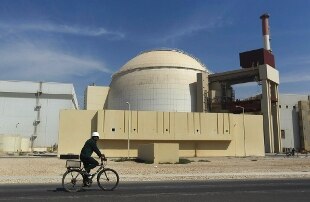- Iran: from today we increase uranium enrichment over 3.6%
- Iran: "From 7 July we will increase the percentage of enrichment of uranium"
- High voltage US Iran. Tehran replies to Trump's sanctions: "For ever closed via diplomacy"
- Green light for new US sanctions against Iran, also against Khamenei
Share
07 July 2019 The appeal for prudence launched in extremis Saturday night by French President Emmanuel Macron in a one-hour telephone call with Hassan Rohani was not enough: as announced by the Iranian president, Tehran said he is proceeding to raise the enrichment of the uranium to a greater extent than allowed by the agreement on nuclear power in 2015, helping to fuel tensions with the US, already at the guard level. Through Secretary of State Mike Pompeo, Washington responds by promising to the Islamic Republic "further isolation and sanctions, because, says the head of American diplomacy," the Iranian regime, armed with nuclear weapons, will pose an even greater danger to the world". Later, President Trump adds to the dose: "Better watch out for Iran," he said.The concentration of uranium 235 (the one directly fissile) in the stocks held by the Islamic Republic is taken beyond the threshold of 3.67% allowed by the agreement, announced Behruz Kamalvandi, spokesman of the Iranian Atomic Energy Organization, without specifying the new limit. On the eve, however, Ali Akbar Velayati, a former foreign minister and influential adviser to the Ali Khamenei Guide, had spoken of a 5% enrichment. Still very far from the 90% needed to build nuclear weapons, but enough to send a message of challenge not only to the United States - which in any case from the 2015 agreement had withdrawn last year - but also to European countries, accused by Tehran to have done nothing to alleviate the effects of the sanctions imposed by Washington that are strangling the Iranian economy.
Iran, said the spokesman of the Parliament's Energy Commission, Mr Assadollah Gharenkhani, said "only words are a mise-en-scène" the promises made by more than a year in the European countries signatories to the agreement, France, Great Britain and Germany, to make a financial instrument operational to continue transactions with Iran. The first thing Europeans should do, notes Gharenkhani, is to help Tehran resume its oil exports, which the US administration of Donald Trump has managed to cut drastically by putting pressure on the entire international community. Just Germany and Britain, as done by France on Saturday through Macron, expressed their "concern" about Tehran's move, asking it to back off.
The Iranian Foreign Minister, Mohammad Javad Zarif, replies that the measures taken are "reversible", but only if the Europeans really commit themselves to countering the effects of US sanctions, opposing "American unilateralism". If this does not happen, Iran, far from being relegated, will proceed in 60 days to a "third stage" towards the overcoming of the 2015 agreement, after the increase two months ago of low-level enriched uranium reserves beyond the limit of 300 kilograms and, now, the increase in enrichment levels. But the authorities of the Islamic Republic have not specified in detail what will be the next move. According to Benyamin Netanyahu, exceeding the enrichment threshold has only one purpose, "the production of atomic bombs". For this reason the Israeli prime minister also asks Europe to "restore sanctions" to Iran, decreeing the failure of the 2015 agreement that Netanyahu himself has always opposed. While Iran states that the purpose of its moves is precisely to save this agreement, pushing Europeans to take concrete steps to keep it alive. The next act of the long tug-of-war is scheduled for Wednesday, when the International Atomic Energy Agency (IAEA) will meet in Vienna for an emergency session requested by the United States.

